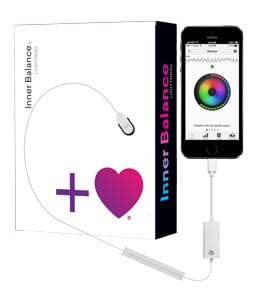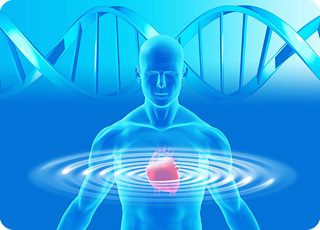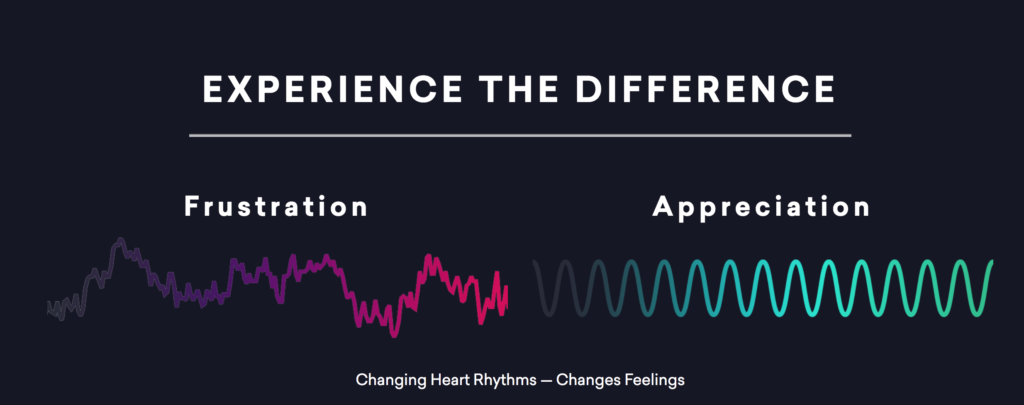Relieve Stress Naturally with HRV Biofeedback
What is HRV Biofeedback?
Journal of the American College of Cardiology
HRV biofeedback or heart rate variability biofeedback is a tool for measuring the naturally occurring variations in your heart rate. HRV biofeedback is an excellent tool for managing stress, anxiety, and stress-related depression. HRV Biofeedback teaches you how to shift your emotional state from anger, stress, fear (or other negative emotions) into a state of calm and clear thinking.
You do not need to know science or math to practice HRV biofeedback. The HeartMath Inner Balance is simple and easy to use; you simply clip a sensor on your earlobe and use the app and follow the color scheme of going from red to blue to green. If you like science as I do, you may be interested in knowing more.
Why is HRV Biofeedback Important?
HRV Biofeedback trains you to shift and replace emotional stress with emotional balance and coherence.
HRV is a unique indication of health and vibrancy. Stress, anxiety, and depression reduce this biomarker. The association between depression and cardiac events has been well documented in Western medicine in recent decades. Low HRV is a common denominator in many illnesses including the inter-related diseases of coronary heart disease and depression. HRV is very important for heart patients.
In their research article “Depression and heart rate variability in patients with coronary heart disease” RM Carney et al. of the Cleveland Clinic state that: “Depression is associated with autonomic nervous system dysfunction, which may at least partially explain this increased risk. Low heart rate variability (HRV), which reflects excessive sympathetic and/or inadequate parasympathetic modulation of heart rate, is a strong predictor of mortality in patients with CHD. “
The cycle of stress, anxiety, and depression can lead to inflammation, heart disease, and low HRV. Interrupt the cycle with HRV biofeedback and revitalize your health.
HRV biofeedback provides the reliability of evidence-based science together with self-regulating behaviors such as using breathing techniques as well as other strategies discussed below. HRV biofeedback is non-invasive, inexpensive (when using a smartphone app), and is an emerging area of biofeedback.
Relieve stress naturally with HRV biofeedback. HRV is the measure of the naturally occurring beat-to-beat changes in heart rate. HRV is an indicator of how resilient the heart is and how efficiently it speeds up and slows down, even while resting. HRV serves as a critical biomarker for gauging human health, resiliency, and a predictor of all-cause morbidity. Simply put, HRV is the rate of change of heart rate.
Heartbeats with little variation over time (i.e. once per second) is indicative of low HRV. Clinically, the example of HRV of zero is not viable, and I use it here only to illustrate the point clear. A heart in physiological coherence generates rhythmic, symmetrical patterns, measured from the beat-to-beat changes in heart rate. As a person inhales, his or her heart rate increases; upon exhalation, the heart rate decreases.
A couple of key milestones in the use of HRV include:
- 1960-70’S: Lacey, the heart communicates with brain & effects human emotions
- 1974: Gahery & Vigier research the vagus nerve (X Cranial Nerve)
- 1991: Dr. J. Andrew Armour induces the concept of “ Heart-Brain”
HRV is an invaluable biomarker and underutilized biomarker in healthcare today. Fortunately, this trend is turning. Recently, HRV has begun to gain recognition through research on stress and heart rhythm. Organizations such as HeartMath® have done extensive research in recent years on the relationships among HRV, stress, heart coherence, and the nervous and hormonal systems.
How Can I Optimize My HRV?
There are many practices that help you relieve stress naturally with HRV optimization. Some people will want to stick with evidence-based approaches whereas other people are open to ancient practices. Experiment explore and find a practice that is “just right” for you. How To Relieve Stress Naturally is dedicated to helping you find solutions to stress, anxiety, and stress-induced depression. I use a combination of yoga, meditation, energy medicine, HRV biofeedback, and essentially everything that I promote on this site.
3 Ways to Relieve Stress Naturally:
HeartMath® HRV Biofeedback | Product Review
To learn more about HeartMath and order directly from the company click here.

Reduce stress and anxiety the natural way.
In addition to HRV Biofeedback to relieve stress naturally, consider adding the following to your lifestyle.
2. 11 Minute Meds
Practicing short medical-grade meditations is a highly effective way to optimize your HRV. Many students who meditate regularly have excellent HRV outcomes. Combine 11 Minute Meds with HRV Biofeedback for a powerful strategy to relieve stress, anxiety, and stress-induced depression.

3. Kundalini Yoga
For people who want to take stress relief to the next level, Kundalini Yoga is fast-acting and highly effective in counteracting the effects of chronic stress, anxiety, and stress-induced depression.
Anne Taylor, Ph.D. is a former Senior Director of Product Development for an International Heart Monitoring Company (Video)
Although new to many people, HRV biofeedback has been around for a while. It was first used in the 1960s as a fetal monitor to determine if the baby was in trouble during childbirth. Since then, HRV biofeedback has been used extensively for relieving stress, anxiety, and anger naturally.

You don’t have to do this alone. Let’s chat and see if I can help you with your specific stress-related challenge.
Schedule a FREE 15-minute call with Dr. Anne now.


